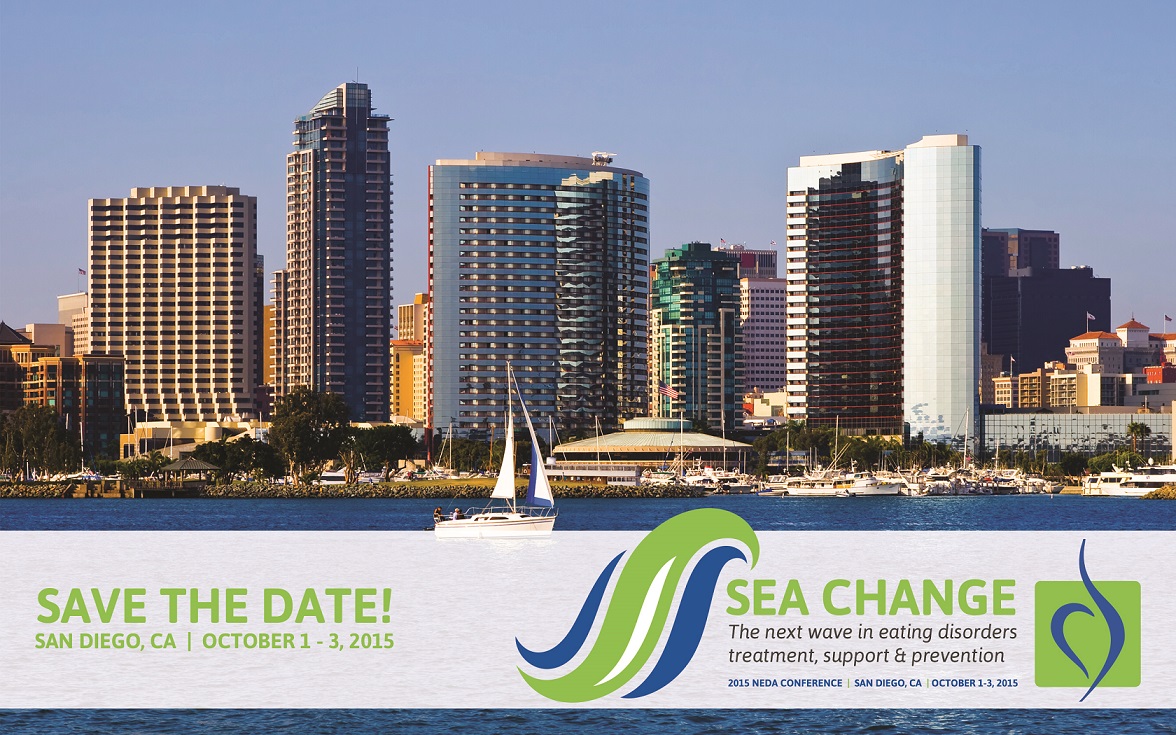International Eating Disorder Action members review, recap, and reflect on the #NEDA2015 Conference that took place October 1-3 in San Diego, CA
NEDA 2015, Sea Change: Advocates are being heard and respected!
By: Celia Robicheau
The NEDA 2015 conference in San Diego was great. It was a great opportunity to meet and hear some of the biggest names in the ED world speak about their professional views and approach to treating ED.
It was fascinating to hear of the latest research being conducted around the USA by many well-known universities. It was devastating and hopeful to hear of loss, of wins, of hope from survivors, parents and providers. One common theme I heard, was the great amount of programs and services available to sufferers around the country if only everyone COULD HAVE ACCESS TO THEM.
My overall impressions from NEDA 2015:
- Advocates are being heard, respected and brought to the “big kids” table. We are no longer being patted in the head in a condescending way.
- Advocacy presence at NEDA was huge. Educated parents shared tables with professionals and I felt heard and taken into consideration.
- Our opinions were sought out by experts, they felt that to make their programs, services and practice stronger and better it was imperative to develop them with our needs in mind.
- Family/parents role is growing in support as key but sadly we still saw many professional bluntly dismiss the parent role.
- Veritas, ERC and Lauradete representatives actively reached out to parents:
To ask them to be part of their discussions and to ask what as parents they wanted their programs to bring to recovery. They acknowledged that treatment is relatively a short time and that parents are ones tasked to continue treatment with their children at home 24/7. Therefore, parents must have an equal role in the treatment team, they need to be part of the daily happenings. Parents themselves have to be educated, trained and supported in continuing the work at home and not left to “figure it out.” Programs that use a strengths based family system seem more successful long term. There was an overall theme of “together we can do this work” - Dr. S. Was once again (after ICED 2015) a disappointment. He was dismissive of the parents/caretaker/familial role, their importance in recovery, and lack of acknowledgment that regardless of sufferer age it is the bulk of care that falls on the parents/caretakers shoulders
Dr. S. 's presentation was infuriating as he dismissed a mother’s experience who was brave enough to disagree with him and he was bluntly disrespectful to a sufferer who shared her story. Dr. S. also insisted (contrary to new research being done within the last 5 years) that waiting for the sufferer to want help is the only way, and that he will sit next to their beds and do nothing until they ask for help. This is maddening as we know that recovery can start and be maintained despite patient compliance or acknowledgement of illness. Waiting is not only ineffective but potentially a death sentence. It was very frightening to have a well-known and respected provider mentioning decades of research and ignore the most recent research. When we speak of scientific research, we do a historical review of evidence/data and then concentrate in the last 5/6 years of research as anything older is considered outdated. I was very saddened to look around Dr. S's presentation room and seeing so many young, right off school providers nodding and writing down every word he said. They were listening to every word of this “expert” and believing it to be “the way”. - There are is still a lot of awareness work to be done by advocates and professionals to create a unified front.
- Smashing scales may be very visually powerful, however, it's unrelated to eating disorders, it doesn’t help to dispel myth, to raise awareness or to help identify early symptoms.
- College representatives still insisted that sufferer can do recovery work while attending classes and being supported at their counseling centers. I believed this to be poor advice for someone with an active ED. Only one representative in the college presentations said that school can and should wait and to put health first.
- We need to shout from the top of our lungs that disordered eating is NOT an eating disorder. Educated experts are mixing the two and creating confusion.
- We really really really really need to get away from the stereotypes that feed ED myths. There is no reason to feed “the choice” and the “vanity” myths, we have a wealth of clinical research and its time to speak facts and not opinions.

*Picture taken at the UCSD Dinner*



